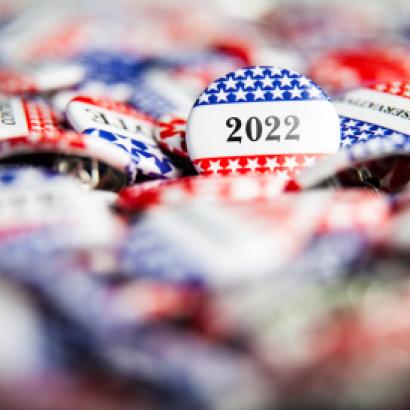- California
As this is the year’s final California on Your Mind column, let’s pick a few political and policy winners and losers (and a few entities that don’t fit into either category but are still fun to mention) from the previous 11-plus months.
They would include . . .
Winner: California Democrats. The Golden State ended 2022 as it began, a big, blue fortress for Democratic incumbents, aspirants, and their progressive dreams.
California governor Gavin Newsom breezed to reelection (thanks to term limits, he has to step aside in January 2027), as did every other Democrat seeking a statewide office. (Republicans have won only three of 56 state and federal partisan-designated statewide races dating back to 2002). Meanwhile, Democrats maintained their supermajorities in both legislative chambers—62 of 80 seats in the State Assembly; 31 of 40 seats in the State Senate.
One positive note in the face of this lopsided continuity: nearly one-third of California’s state legislators (at least 37 of 120) will be new to the State Capitol. Whether they bring new energy—and sensibilities—to the business of California government will be one of 2023’s more intriguing subplots.
Loser: California Democrats. Despite the aforementioned electoral dominance, California Democrats underachieved in 2022 in one key regard: trying to keep majority control of the US House of Representatives. California’s new congressional delegation, heading to Washington in 2023, will include 40 Democrats and 12 Republicans, as opposed to 42 Democrats and 11 Republicans before the November election (a less populous California lost one House seat after the 2020 Census, which explains the difference in delegation totals).
How did Democrats fail to hold on to the House? Tradition, one might argue (the president’s party tends to suffer in midterm elections). But also because of the GOP’s ability to flip four House seats in deep-blue New York, coupled with a Democratic inability to flip a handful of House seats the Golden State. Were it a more conventional election, with Republicans struggling in the two Democratic strongholds, Nancy Pelosi might have held on to her leadership post. Go figure.
Winner: California’s Initiative Industry. Want to strike it rich in California politics? Hang out a consultant’s shingle and get in the business of statewide ballot initiatives and referenda.
In 2022, interest groups raised over $762 million toward praise and denunciation of the seven measures on this year’s ballot. You can blame this cash bonanza in part on political “reform”—in this case, California’s mailing ballots to voters a month before Election Day, which has convinced initiative campaigns to start their television ads earlier than usual.
One takeaway: money can’t buy you love—or, in the Golden State, the votes you need. Online gaming companies and California gaming tribes spent over $420 million combined on the sports-betting Propositions 26 and 27. Voters decidedly rejected both measures.
Loser: Sacramento Word Games. OK, I might be a little biased when it comes to government promises—it’s mid-December and I’m still waiting for a “Middle Class Tax Refund” that was promised back in June when gasoline prices were approaching $7 a gallon in the Golden State and lawmakers feared the wrath of inflation-battered voters.
The weeks before Christmas provided Californians with a surreal holiday performance—governor Newsom playing fast and loose with the word “tax.” Newsom wants to impose a “maximum gross gasoline refining margin” (at a cost of a yet-to-be-determined cents per gallon) on California petroleum concerns. If a refiner blows past that “margin,” the California Energy Commission can impose a civil penalty that goes into a “Price Gouging Penalty Fund” that (supposedly) would get kicked back to consumers.
Why the governor’s resistance to the “t-word”? Because under California law (1978’s Proposition 13), tax increases require two-thirds approval by both chambers of the state legislature.
A side-note: as you read this, some poor soul in the governor’s office may be on cleanup, making headlines like this one disappear if the governor wants to deny that it’s a tax increase he’s seeking.
Winner: Disney CEO Robert Iger. He didn’t walk on water in 2022, much less turn water into wine, but Iger’s return as the entertainment giant’s CEO had messianic overtones. The year ahead will see whether Iger made the right choice.
Regardless, could Iger’s return be any worse than the time he spent as a member of Newsom’s ill-fated economic recovery task force? (Iger eventually quit the panel due to his frustration with the state dragging its feet over the reopening of Disneyland and other California theme parks as the pandemic began to ease.)
Loser: Disney. Yes, “the Mouse” got back its cherished CEO . . . but it also ended the year with one big embarrassment: its animated film Strange World bombing at the box office. The film introduced the world to Disney’s first LGBTQ+ teenaged character, which maybe was a little too much for some parents (a movie critic noted: “Go woke, go broke”).
Still, that one cinematic setback will be soon forgotten if Iger pulls off the sale of the (new) century: selling Disney to cash-rich and content-hungry Apple.
Winner: Newsom’s California Prospects. Being a California governor is a job tailor-made for last-word freaks, given both the reach of the gubernatorial bully pulpit and the executive’s dominance over the legislative branch (one has to go back over 40 years to find a gubernatorial veto being overridden).
The year 2022 proved once again that “it’s good to be the king,” with Newsom signing a budget negotiated mostly along his terms, while selectively vetoing bills under the guise of looming fiscal austerity.
Loser: Newsom’s National Prospects. News that didn’t get much attention in California: Democrats looking at a different schedule for the advent of 2024’s presidential primary season—South Carolina going first, followed by a joint primary day for New Hampshire and Nevada, with later primaries in Georgia and Michigan.
In theory, that’s good news for Vice President Kamala Harris in South Carolina and Nevada’s minority-rich Democratic primaries.
Meanwhile, after openly second-guessing his party’s national strategy for the midterm election as November neared, Newsom found himself on the receiving end of this brushback from Minnesota senator Amy Klobuchar: “You know what? He’s out there in California right now and I am out here and have been all over Ohio . . . in Pennsylvania . . . in Wisconsin and in North Carolina. . . . We’re going to win those races. So he can talk about all he wants out there. I am in the middle of it.”
A preview of what lies ahead for Newsom and Klobuchar in 2023 2024?
Winner: Elon Musk. Sure, he ends the year having lost about 40% of his once-estimated $320 billion fortune, but Musk falls into the “winner” category in that he managed to unhinge his biggest critics on the Left after his takeover of Twitter.
Seizing control of the social media giant and dealing with its discordant workforce may prove to be, for Musk, what Ukraine was for Vladimir Putin in 2022: a supposed cakewalk that turned into a morass. Still, credit the man for sparking a free-speech debate that will carry well into 2023.
Loser: Twitter’s Culture. It rained like the dickens in the San Francisco Bay Area last weekend, but it didn’t snow at lower elevations. That said, Musk’s Twitter takeover exposed the worst of the company’s self-pitying “snowflake” culture.
Let’s say Musk’s endeavor falls apart and he ends up walking away from Twitter. Does the company ever get its reputation back? Moreover, how much of a hit does the Twitter “old guard” (pre-Musk management) take after House Republicans hold hearings on the “Twitter files” and partisan news suppression?
Winner: California Pro Football. This is more about early 2022 than late 2022—Super Bowl LVI in Los Angeles’s state-of-the-art SoFi Stadium, with the hometown Rams (now a shell of their former selves) taking home the trophy. Could the talented (but injury-plagued) San Francisco 49ers make it two straight Super Bowl titles for the Golden State?
Loser: California Pro Baseball. Sure, the San Diego Padres just went on a free-agent spending spree and the Los Angeles Dodgers remain an elite franchise, but consider the one that got away: California native Aaron Judge. The American League’s most valuable player spurned offers from the Padres and San Francisco Giants, opting instead to stay with the New York City (despite the Padres reportedly being willing to go well beyond the $360 million deal that kept Judge on the East Coast).
Let’s call this one a doubleheader: in 2023, does a California team land the services of free-agent-to-be Shohei Ohtani, whose skills could fetch up to $500 million on the open market?
Winner: California Fish. As 2022 neared its end, federal and state regulators unveiled a plan to demolish four dams along California’s Klamath River, thus boosting the fortunes of Chinook and Coho salmon looking to return from the Pacific Ocean to their upstream spawning grounds.
Loser: California Cattle. Imagine the daily existence of California bovine—valued for their milk and beef but also doggedly pursued for the role their methane emissions play in climate change (an environmental satellite hovers over the San Joaquin Valley whose mission is to assess methane-laden cow burps).
On other cow-related news, 2022 was a bad year for burger flippers, what with a new state fast-food council in the works (I defer to my colleague Lee Ohanian on how this could impact California’s $20 billion fast-food industry).
Here’s wishing you a happy holiday season.
See you in 2023.

















